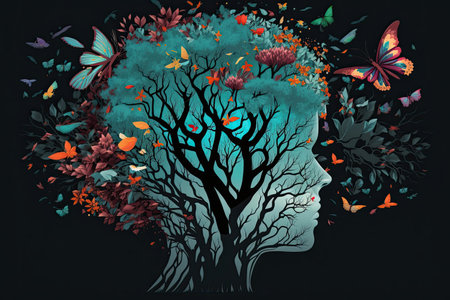Mental Health Awareness in Kenya: Breaking the Silence
 In recent years, the global conversation around mental health has gained momentum, shedding light on the often overlooked and stigmatized aspects of mental well-being. However, as we delve into this crucial discourse, it becomes apparent that there is still much work to be done, particularly in regions like Kenya, where mental health awareness is an emerging concern. Mental health is a state of mental well-being that enables people to cope with the stresses of life, realize their abilities, learn well and work well, and contribute to their community.
In recent years, the global conversation around mental health has gained momentum, shedding light on the often overlooked and stigmatized aspects of mental well-being. However, as we delve into this crucial discourse, it becomes apparent that there is still much work to be done, particularly in regions like Kenya, where mental health awareness is an emerging concern. Mental health is a state of mental well-being that enables people to cope with the stresses of life, realize their abilities, learn well and work well, and contribute to their community.
The State of Mental Health in Kenya:
Kenya, like many other countries, grapples with a myriad of mental health challenges. The World Health Organization estimates that one in four people worldwide will be affected by a mental health issue at some point in their lives. In Kenya, this translates to millions of individuals silently battling conditions ranging from anxiety and depression to more severe disorders like schizophrenia.
One of the significant obstacles to addressing mental health in Kenya is the persistent stigma surrounding the topic. Mental health issues are often misunderstood or dismissed, leading to a lack of awareness and inadequate support for those in need. This stigma permeates societal attitudes, the workplace, and even healthcare settings, creating barriers to seeking help and perpetuating a cycle of suffering in silence.
Cultural Influences on Mental Health Awareness:
Kenya’s diverse cultural landscape plays a pivotal role in shaping attitudes towards mental health. Traditional beliefs, social norms, and religious practices can impact how mental health is perceived and addressed within communities. While these cultural factors can offer valuable support networks, they can also contribute to the stigmatization of mental health issues.
It is essential to recognize and respect the rich cultural tapestry of Kenya while simultaneously working to challenge harmful beliefs and practices that hinder mental health awareness. Community-driven initiatives that blend traditional values with evidence-based mental health education can help bridge this gap and foster a more inclusive understanding of well-being.
The Impact of Socioeconomic Factors:
Socioeconomic factors also play a significant role in mental health outcomes. In Kenya, as in many other developing countries, limited access to quality healthcare, education, and economic opportunities can exacerbate mental health challenges. Poverty, unemployment, and inadequate social support structures create an environment where mental health struggles are more likely to go unnoticed and untreated.
We have psychologists being trained, but because there is no structure, psychologists are poorly employed and end up volunteering their time. The people who end up having the resources to run rehabilitation centers are psychiatrists whose training is in mental illness. Psychologists can do a lot in prevention before people become mentally ill. The skills people learn through recovery through therapy translate into other parts of their lives. They work better, they have better relationships at home, they function well in the community, they look for social support and build on it. That is the value of psychology.
Efforts to raise awareness about mental health in Kenya must address these systemic issues. Advocacy for improved healthcare infrastructure, increased access to mental health services, and initiatives that promote economic empowerment can contribute to a more holistic approach to mental well-being.
Government Initiatives and Policy Advocacy:
While progress has been made, there is a pressing need for stronger government involvement in mental health initiatives. Policy frameworks that prioritize mental health, allocate sufficient resources, and work towards reducing stigma are crucial for creating a supportive environment.
In recent years, Kenya has taken steps to address mental health challenges, including the development of the Mental Health Policy (2015-2030). However, effective implementation and continuous evaluation are necessary to ensure that these policies translate into meaningful change on the ground.
Community-Based Interventions:
Community engagement is a powerful tool in promoting mental health awareness. Grassroots initiatives that involve local leaders, schools, religious institutions, and community organizations can effectively challenge stigma and disseminate information about mental health.
Educational programs aimed at schools can play a pivotal role in shaping the attitudes of the younger generation. By integrating mental health education into the curriculum, we can empower young Kenyans with the knowledge and skills needed to navigate their mental well-being and support their peers.
Additionally, fostering partnerships with traditional healers, religious leaders, and community elders can help integrate mental health discussions into existing cultural frameworks. These partnerships can contribute to the development of culturally sensitive approaches to mental health awareness and support.
The Role of Media in Shaping Narratives:
Media plays a crucial role in shaping public perceptions and attitudes. In Kenya, where media consumption is widespread, there is an opportunity to leverage various platforms to disseminate accurate information about mental health.
Media campaigns that feature personal stories, expert interviews, and debunk common myths can contribute to normalizing discussions around mental health. By portraying mental health as a vital aspect of overall well-being, media can play a pivotal role in breaking down stigma and encouraging individuals to seek help.
Mental Health Services in Kenya
- Public Mental Health Facilities:
Kenya has various public mental health facilities that provide services ranging from counseling to psychiatric treatment. Mathari National Teaching and Referral Hospital in Nairobi is one of the prominent mental health facilities in the country. However, despite these facilities, there is a need for more widespread access to mental health care services, especially in rural areas.
- Non-Governmental Organizations (NGOs):
Numerous NGOs in Kenya are dedicated to mental health advocacy, awareness, and support. Organizations like the Kenya Mental Health Alliance (KeMHA) and BasicNeeds Kenya work towards reducing stigma and providing community-based mental health services. These organizations often play a crucial role in filling the gaps left by public services.
- Telehealth and Online Resources:
The rise of technology has facilitated the growth of telehealth services in Kenya. Platforms like MyDawa and iSikCure provide online consultations with mental health professionals, making it more accessible for individuals to seek help. Additionally, online resources such as helplines and mental health websites offer information and support.
Exploring Activities to Boost Mental Health in Kenya
- Nature Walks and Hikes:
Kenya is blessed with breathtaking natural beauty, from the savannahs of the Maasai Mara to the slopes of Mount Kenya. Engaging in nature walks and hikes provides an excellent opportunity for Kenyans to connect with the environment, reduce stress, and enjoy the therapeutic benefits of being in nature. Local nature reserves, such as Karura Forest in Nairobi, offer a peaceful escape from the hustle and bustle of urban life.
- Community Bonding through Harambees:
Harambees, or community fundraisers, are deeply ingrained in Kenyan culture. Participating in or organizing harambees fosters a sense of community and belonging. Acts of communal support not only contribute to a shared purpose but also create strong social bonds, promoting emotional well-being.
- Meditation and Mindfulness:
Mindfulness practices, such as meditation, can be immensely beneficial for mental health. Kenyans can explore mindfulness through guided meditation sessions, yoga classes, or even simple daily practices like deep breathing. These techniques help individuals manage stress, improve focus, and cultivate a positive mindset.
- Traditional Dance and Music:
Kenya’s rich cultural diversity is celebrated through its traditional dances and music. Engaging in these art forms not only provides a physical outlet for self-expression but also serves as a form of therapy. Dance and music can be powerful tools to release pent-up emotions, boost mood, and promote a sense of joy.
Volunteer and Community Service:
Participating in volunteer activities allows individuals to contribute to the well-being of others, fostering a sense of purpose and fulfillment. Whether it’s helping out at local schools, supporting healthcare initiatives, or participating in environmental conservation projects, volunteering provides a meaningful way to connect with the community and enhance mental health.
- Sports and Physical Exercise:
Regular physical activity is essential for both physical and mental health. Kenyans can enjoy sports like athletics, football, and rugby, which not only contribute to overall fitness but also release endorphins, the body’s natural mood lifters. Local sports clubs and community teams provide opportunities for social interaction and support.
- Art and Creativity:
Engaging in creative activities, such as painting, drawing, or crafting, can be therapeutic. Kenya’s rich artistic traditions offer inspiration for individuals to explore their creative side, providing an outlet for self-expression and emotional release.
Conclusion:
The journey towards mental health awareness in Kenya is multi-faceted and requires collaborative efforts from individuals, communities, government bodies, and the media. By fostering an environment where mental health is openly discussed, understood, and supported, Kenya can work towards breaking the silence surrounding mental health issues.
It is crucial for stakeholders to recognize the intersectionality of factors contributing to mental health challenges and address them comprehensively. Through education, advocacy, and community engagement, Kenya can pave the way for a future where mental health is prioritized, stigma is dismantled, and individuals are empowered to lead fulfilling lives. Breaking the silence is the first step towards building a more compassionate and inclusive society for all.
